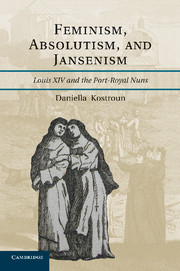Book contents
- Frontmatter
- Contents
- Acknowledgments
- Abbreviations
- Introduction
- 1 Jansenism as a “Woman Problem”
- 2 Controversy and Reform at Port-Royal
- 3 Jansenism's Political Turn, 1652–1661
- 4 The Limits to Obedience, 1661–1664
- 5 A Feminist Response to Absolutism, 1664–1669
- 6 The Unsettled Peace, 1669–1679
- 7 A Royal Victory, 1679–1709
- Conclusion
- Bibliography
- Index
- References
4 - The Limits to Obedience, 1661–1664
Published online by Cambridge University Press: 05 August 2011
- Frontmatter
- Contents
- Acknowledgments
- Abbreviations
- Introduction
- 1 Jansenism as a “Woman Problem”
- 2 Controversy and Reform at Port-Royal
- 3 Jansenism's Political Turn, 1652–1661
- 4 The Limits to Obedience, 1661–1664
- 5 A Feminist Response to Absolutism, 1664–1669
- 6 The Unsettled Peace, 1669–1679
- 7 A Royal Victory, 1679–1709
- Conclusion
- Bibliography
- Index
- References
Summary
The first major change in the meaning and context of the Jansenist debates occurred during the Fronde. In the years between 1652 and his death in 1661, Mazarin had initiated the persecution of Jansenists as a way to discredit Cardinal de Retz. Along the way, this persecution helped him consolidate state power over Gallican bishops and Parlement.
The second major change in the Jansenist debates took place in 1661 when King Louis XIV came to power and declared that he would rule personally without a minister. When Louis XIV ascended the throne, he continued Mazarin's strategy against Retz and further consolidated his power by redefining Jansenist persecution as necessary for “his faith, his honor, and for the good of the state.” By making this persecution a personal matter, Louis XIV initiated his legacy of “divine right” leadership by tapping into two broad intellectual and political developments taking place in Europe at the time. First, his actions reflected a trend in which the individual became a source of certainty in questions both moral and epistemological. Second, the emphasis on his own faith fit into a European trend in which relationships between monarchs and subjects were redefined so that kings became model “Christian selves” with whom subjects were meant to identify. The ideal seventeenth-century monarch now “reflect[ed] not only God but also the divine element that is in the individual, so that every subject can recognize himself or herself in a royal being who commands our love.”
- Type
- Chapter
- Information
- Feminism, Absolutism, and JansenismLouis XIV and the Port-Royal Nuns, pp. 104 - 140Publisher: Cambridge University PressPrint publication year: 2011



